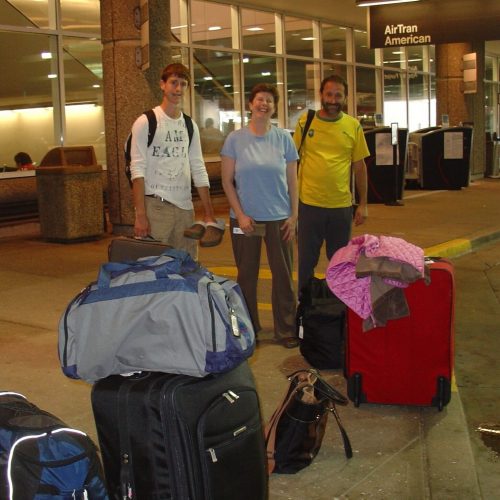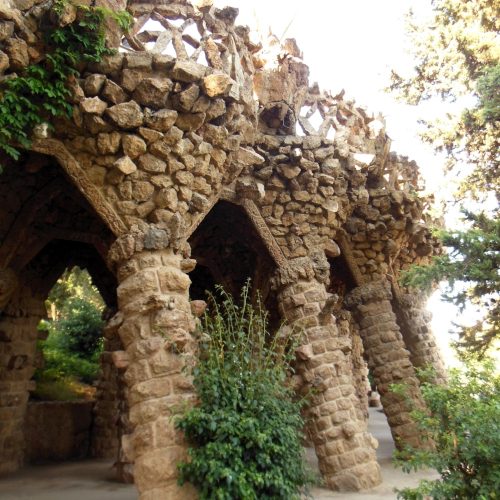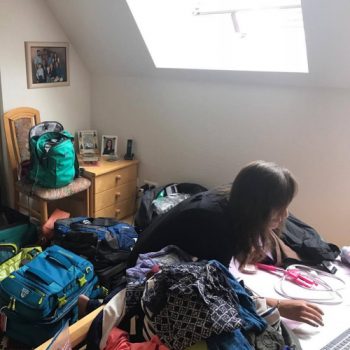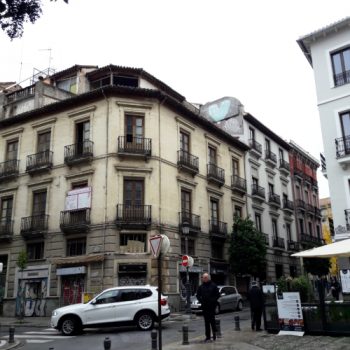
Moving Abroad to Spain as a Family: An Interview
Dear Hannah,
In 2008 my family decided to leave the small town my younger brother and I were being raised in and move across the ocean to Spain. Being stubborn, I decided I didn’t want to join them, but they were not fazed and let me finish high school before heading on an adventure of a lifetime. We recently sat down to discuss some of the details. These are the questions that I asked them and the answers that they gave.
Note: For anonymity’s sake, I will refer to my brother as B, my father as F, and my mother as M.

Claudia: Tell me a little bit about the family background and how you ended up in Spain from each of your perspectives.
Brother: I was a sophomore in high school and my parents decided they no longer wanted to live in Wisconsin because they were ready for a change. They decided we were going to move somewhere outside of the US and debated various options. For many reasons we decided on Spain and one night over dinner with good Spanish friends with a map of the country,we decided that within Spain we would try Granada. While Claudia wanted to finish high school, my parents didn’t really give me that option. I did my junior and senior year of high school in Spain and then university too. Claudia ended up joining us for her bachelors degree here as well.
Father: We had gotten to a point where we figured we were ready to try something new. We had been in Wisconsin for 20+ years and it had been a great place to raise kids but we wanted the kids to see more of the world. They had already traveled a lot—my family was out west and my wife’s family is from England but traveling isn’t the same as living somewhere abroad.
I initially didn’t consider going to Europe at all. I thought going to South America would be really cool, especially Uruguay in particular for no other reason than I thought it was cool.
But then we started thinking about M’s parents getting old and we realized that we really sort of needed to be in Europe. We discarded England, where M grew up and her parents lived because we wanted to have a really different experience for the kids, especially B. We thought Spanish was a great second language and with Spain close to England, it was perfect. We have some friends from the north of Spain who suggested that we should be in a Castilian speaking area (see more about the languages of Spain here). They polled all their friends and decided that Granada was pretty nice based on the size, the history, the University, etc. We visited Granada, and decided it looked good.
Mother: Living in midwestern Wisconsin for 20+ years gave us lots of opportunities but it got to the point where it seemed like the right time to move. I am from Europe, so choosing a place where we could be close to my family felt really good at the time as well. Professionally, I was burned out with what I was doing at the corporation where I was working and I really wanted to change my perspective. I took the opportunity to take a break from work as well, which I really needed. It was a bunch of things that came together at the right time.
F: And from a family point of view, it did work! M’s parents passed within around 7 years of us moving to Spain and we were able to spend a lot of time with them, taking care and sharing in the last years of their lives which was a gift to all of us. It worked really well, probably better than we could have expected.

Claudia: And can you guys tell me a little bit about what it is like to move abroad as a family? And a little bit of the logistics of pulling that off as well?
F: Practically we had to save money, every step of the way—we ended up flying through London on a really long trip, each with two suitcases. We were lugging them around because we tried to find a cheap way to move. At the time we just didn’t know how much money we were going to need or if we even had enough money to survive. We didn’t really know what we were going to do for work or how anything was going to work out long term.
Our friends from northern Spain had given us a pretty good list of lawyer and accountant contacts to start. We had a good idea of the direction we needed to go, although I don’t think we really knew what it would mean. We were pretty naive actually about how much work it was going to be and that was probably a good thing. I don’t think we probably wanted to know how much bureaucracy it was going to be to get settled in here.
I would guess that it is probably the same everywhere when you are starting life in a new country—you’ve got to wait in line, prove you are here for a reason, and be patient. We were lucky because England was part of the EU at the time, so we could move here legally, which compared to other people made it pretty easy for us. It was still a huge amount of work though.
B: I was pretty ignorant for a while about anything going on. What I remember most clearly before we left is that we had a lot of belongings and we had to do something with it all. I spent the summer not really doing anything and letting other people pack it up but I think it was probably a lot of work to go through the stuff and decide what we wanted to keep and what to get rid of. Most of what we had was more about the memories but I always find that you end up looking at the stuff you keep and think “why did I bring this?” So, in the end you bring a couple of things along that remind you of your old life and the basic clothes that you normally wear. Then you get on a plane and just find another wardrobe to put them in.
I started going to Spanish school and our parents took care of all the bureaucratic work that needed to be done. I had to get into high school which required a lot of sitting in an office, waiting for instructions. Everything was waiting really—getting a home, getting your residency status. These days it is funny because I am the most proficient Spanish speaker so I would probably sort out all the bureaucratic stuff; I just deal with it. But back then my parents did everything. If I had to give advice for that kind of thing, the best option is probably to talk to someone directly because if you just try to read about it online, it just is confusing but if you talk to someone about it, they will tell you what you need.
F: And the rules don’t always seem to make sense at the time, even if you figure them out later. I can remember trying to find an apartment and we couldn’t understand how to rent an apartment because the rules are different from what we were used to back home. There were a lot of people who only wanted to rent to students and didn’t want to rent an apartment to a family. People would look at us funny because we wanted to rent as a family.
In the end, we decided that we wanted to live in the neighborhood we chose because we wanted B to be in a certain school system. We asked someone if we had to live there for B to go to school at that school and the administrator helping us told us that it was one of the requirements. She also said that she thought we would like it because it is a really good area as well. We took her advice and we have lived in the same neighborhood ever since.
 M: I think the hard thing at the beginning was that we had nothing, not a bank account or address or phone number or anything, and you cannot do things if you don’t have those details. It is hard to get an apartment if you don’t have a phone number and a bank account but you cannot get a phone number without an address. That makes it difficult even to get started with things, even if there are ways to get around it. For example, we were able to give our passports to get the phone number in the end, but you have to figure it out as you go along and it isn’t always totally clear to foreigners. The trick is to break the cycle at the beginning.
M: I think the hard thing at the beginning was that we had nothing, not a bank account or address or phone number or anything, and you cannot do things if you don’t have those details. It is hard to get an apartment if you don’t have a phone number and a bank account but you cannot get a phone number without an address. That makes it difficult even to get started with things, even if there are ways to get around it. For example, we were able to give our passports to get the phone number in the end, but you have to figure it out as you go along and it isn’t always totally clear to foreigners. The trick is to break the cycle at the beginning.
F: The thing about not knowing how much money we were going to need made it harder as well because we couldn’t just go throw money at the telephone guy to get a number because we didn’t have jobs at the time and we were afraid we were going to run out of money.
M: Not having jobs was hard for us. I had quit my job and although F had the possibility of some part-time work, we didn’t really know if or when we would ever work again properly. We didn’t have endless funds, that is for sure.
Claudia: So, you guys moved just about 12 years ago.
B: 12 years ago in a week. It will be 12 years in a week.
F: Wow.
Claudia: Since then, I guess that everything is different than what you expected. What has fit your initial expectations and what has changed?
M: That over time, we were able to make a stable, financial situation which was scary at the time. I feel really lucky about that.
F: We found that working in the United States part time provided more money than we needed here in Spain, which is good because as older people with not great Spanish we don’t really have the ability to look for a good job here in Spain. Working remotely and going back to the U.S. sometimes made it possible for us to support our lives in Spain.
We also eventually sold our house in the States and bought and renovated a house in Granada with the money from that. Not having a mortgage here makes life easier for us as well. It is still pretty difficult for us to understand some of the bureaucracy and the rules. Understanding the law and accounting are also important for us because we have to follow both U.S. and Spanish rules but we rely heavily on the research we do and support from professionals.
B: My expectations for moving to Spain were not very big in the sense that I don’t know if I had any. But it definitely fulfilled or exceeded my expectations for fitting into Spanish culture. I think for me, it was important to get into high school here, as opposed to starting straight to university. In high school you are basically just there 6 hours a day with 25 Spanish kids and you end up having to fit in with them. They become your friends and they teach you Spanish and you learn with them. And then when I went off to University, I was basically almost Spanish, so I just kept meeting more Spanish people and fitting in.
I think that if you come later and don’t do some sort of obligatory education, it is much harder to become as Spanish as I have. I mean, Claudia speaks good Spanish but there were a lot of times when the Spanish people in her University classes would be like “why should I talk to this foreign person, I already have my group of friends.” The fact that I probably now feel more Spanish than American, even if that might be surprising, is connected to the fact that I speak fluent Spanish and have spent my life here since I was 16.
 Claudia: What about fitting in for the adults?
Claudia: What about fitting in for the adults?
F: We don’t fit in that well. We just meet random people, Spanish or not and sometimes click with them. At least for me, I don’t really speak great Spanish but I can chat with the neighbors. The people are really nice to us, even the ones that are totally traditional Andalusians. They don’t care that we are foreigners. Maybe one of the biggest differences is our ability to small talk. I don’t spend a lot of time talking to people because we run out of commonalities or conversations pretty quickly.
M: I also really miss having the casual conversations that happen when you are able to speak the language well. I have spent a lot of time working remotely so, even when I am in Spain, I am working almost all the time in English, which means that I live in a bubble. I am trying to break my bubble but with covid in the last year and a half, it has been hard. Before covid, I was spending time traveling back and forth between the U.S. and Spain, spending two months there, two months here but for the last year and a half, I have just been here in Spain. Because of this I’ve decided to base myself more in Spain but even if I would want to spend more time speaking Spanish or integrating into the community, the situation now has made it near impossible.
Still, just before covid hit, we opened a space, a workshop, to create something of a community center, to create some common ground and do things together. In order to comply with restrictions and make sure we are staying safe, we haven’t been able to host hardly anyone since then. We are looking forward to what we could do there in the future though.
Over the years, for me, not spending all my time in Spain and not working in Spain has made it more difficult to find those casual conversations, but we are trying to find places to have common ground and do simple things. It is the simple things that are important to me.
F: Most of the people we are friends with are either relatively good at speaking English or non-native Spanish speakers who know what it feels like to not be able to communicate fluently in Spanish. We have some nice international friends, the neighborhood is filled with people who speak some English. So, we speak English to a lot of people.
Claudia: And, in general, what would you say are the benefits and downsides of living in Spain?
B: Great weather in winter is an upside and very hot weather in summer is a downside. In Granada it is too hot in the summer but like 75 degrees in December.
Another upside would be that even though things themselves don’t seem cheaper, life itself is cheaper than in the U.S. So, a t.v. wouldn’t be cheaper but maybe food is cheaper and life in general is cheaper. You don’t need a car really, you can get around in other ways. People have small houses, rents and insurance are cheaper, and the costs of living end up being a lot cheaper. The downside to that is that there are not a lot of great work opportunities in Granada.
 F: In Granada, there are two major industries, tourism / hospitality and the university. So if you are not involved in one of those two things, it is hard.
F: In Granada, there are two major industries, tourism / hospitality and the university. So if you are not involved in one of those two things, it is hard.
One think I find really nice is people are quite social and go out quite a bit. You go out for breakfast and it is completely different from an American breakfast—it’s toast and coffee. I order the big toast with cheese, ham, avocado, or tomato, and it is 4 euros, and it is really nice just to go out and have a coffee and a toast (read more about Spanish breakfast in this post).
B: Spain is a very relaxed, social culture. These little things count.
F: I was thinking yesterday that Spanish people are quite healthy. Even though they smoke cigarettes and they eat a lot of fried foods and animal fat, you see a lot less obesity and health issues here compared to the U.S. People talk about how healthy the Mediterranean diet is and it is true that people probably drink less soda and eat less pre-made meals, but I was wondering if it was more about the relaxed attitude. I don’t see how things necessarily add up to be healthier but maybe a lot of it has to do with how life is lived in general. People here would rather go spend three hours eating dinner together than spend time working on their house to make it worth more money, which is kind of the American way, to constantly be working on things to make them more valuable. In Spain, they would rather drink some wine and eat dinner for a couple of hours while enjoying life.
B: I like that people here don’t carry around guns. I think that it’s something that is important to me these days. I wouldn’t want to live in a place where people can have guns on themselves all of the time.
F: It is not that there is no prohibition around having guns either. You can have a license and go shoot rabbits if you live in the country and no one is going to worry about that. No one is going to yell at you if you have a gun, you just don’t see them everywhere and you definitely cannot carry them around so freely.
M: For me, a big pro is that my health is a lot better. When I was living in the U.S., my health was really bad. It was a combination of work stress and food. I mean, we ate healthily but I cannot explain why, when we moved here, my health improved enormously. Before I was living in a lot of pain but it was mostly undiagnosed and the doctors just thought I would have to live with it forever. We didn’t expect any change but when I moved here things improved so much. I think it was a combination of work stress, life stress, and diet. I was working 9 to 10 hours a day, squeezing in exercise, taking care of things, all those lists of things you should do. When we got here I realized I didn’t have to “be on” all the time and that was really good for me.
F: And M is still fairly active most of the time because that is just her nature to be working on different projects but going for a coffee every morning, or a lot of mornings, makes life really different. You also walk down the street for a beer and tapas regularly. We walk all the time.
B: Even if people are on all the time here, in southern Spain, the healthy aspects of your life like getting a little bit of exercise and being social are built into the work day. It is not abnormal for people here to work from 9 in the morning to 9 at night but you have many other elements in there too. Like going for lunch and such. Days end up being really long, but the social and the work aspects seem to run together and it all seems more relaxed. I would say that M might not be younger looking but she is definitely younger feeling and much happier and healthier than when we moved here.
 F: Another positive thing is the health care system. We have also recently come into contact with the health care system and we are able to understand universal healthcare in a way that we didn’t really understand before. Things like being treated for a severe illness and not having any bills or paperwork or stress over whether or not this will cost too much money or other health related things that in the U.S. you worry about. I am amazed by the stress level difference of going through a major illness when compared to going through a minor illness in the U.S.
F: Another positive thing is the health care system. We have also recently come into contact with the health care system and we are able to understand universal healthcare in a way that we didn’t really understand before. Things like being treated for a severe illness and not having any bills or paperwork or stress over whether or not this will cost too much money or other health related things that in the U.S. you worry about. I am amazed by the stress level difference of going through a major illness when compared to going through a minor illness in the U.S.
When our kids were growing up, we were worried when each of them had surgery (as kids both my brother and I had invasive surgery). We worried for months about how much of the bill was going to be our responsibility. In the U.S. the insurance company wouldn’t tell us how much it would be beforehand because they have these weird equations and it always came out to be more than what they said it was supposed to. Here is a different, relaxed, comfort in the way the system works.
B: And if you try to explain that feeling to a Spanish person, they cannot begin to comprehend it. There is private health care here too but payments cannot vary in the same way because people have the option of public health care. Here you have the right to be taken care of. Maybe to explain it to Spaniards, the easiest way for people to understand the stress of a privatized health care system is by comparing it to taking a pet to the vet. Vets aren’t subsidized like health care in Spain, so people are often reluctant to risk a big bill over something that might not be urgent.
F: Here you only have to pay a tiny amount for your medication as well. The government makes a deal with companies and you are able to get your medication for a very low cost.
B: Another nice thing about living in Spain is that student loans and the costs of being a student in general are negligible, it would make you laugh in the US. Student loans is something that only exists in the movies in Spain because university education is also something pretty subsidised here. It is very socialist in that sense.
F: The university system is also quite competitive. The idea that everyone should go to university exists differently here.
B: Everybody can go to university, or most people can, but getting into medical school or the other degrees that have the best outlook on jobs, the ones that people want, isn’t very easy. You are going to have to work for the degree.
Another difference is that in the U.S. you get into a school and decide your degree. Here you apply for a degree within a school and have to carry out that path. So, here, at the University of Granada, English studies is pretty easy to get into but to get into English – Spanish translation, you have to be competitive with your high school grades and exam results. I don’t know if it is a pro or a con, but the system itself is pretty different.
M: One thing I like about living here is the fact that we are in Europe, which means that we can see people from many different countries every day of the week. It is really cool to see so many people with such a mix of backgrounds. It is also easy to travel to other countries in Europe, which is really fun.
F: A cool thing and a not-so-cool thing is that cities are dense here. It means that your neighbors are really close to you and there is less privacy, but it also means that I can walk across the city in less than an hour.
A con connected to that, for me, is that Granada can be pretty dirty. And people don’t seem to care here about keeping the community spaces clean. It is not that there are no places that are clean, but I do feel for a small town it could be cleaner.
 B: With the dense city though, you almost never seem to see a really overweight kid in Granada. People walk everywhere, probably at least 40 minutes if not 2 hours a day. If you walk 2 hours a day, it is pretty hard to get too heavy. And walking around here is really nice. We walk everywhere. We walk 15 minutes to have a couple of drinks and we don’t have to worry about driving because we just walk 15 minutes back home or take a taxi and it is only a couple of euros to get home.
B: With the dense city though, you almost never seem to see a really overweight kid in Granada. People walk everywhere, probably at least 40 minutes if not 2 hours a day. If you walk 2 hours a day, it is pretty hard to get too heavy. And walking around here is really nice. We walk everywhere. We walk 15 minutes to have a couple of drinks and we don’t have to worry about driving because we just walk 15 minutes back home or take a taxi and it is only a couple of euros to get home.
F: It is hard to think about the pros and the cons because the pros are usually also the cons. Like the density of the city—it can mean the city is dirty but it also means we can walk across it easily. It can be a pro or a con but mostly that is when it is just difficult to get used to. There are aspects I like about things that are also really not that easy to deal with.
Claudia: What recommendations would you have for people looking to move abroad as a family?
M: Do your homework, but then don’t overthink it too much. It is impossible to understand all the little things that will unfold.
F: And I would challenge that and say that you should make sure your family is ready for the change. Once you’ve decided that you are capable of handling it, then I think your mom’s right—throw a dart, do whatever you need to do emotionally or want to do, and go do it. I think it could be very destructive if your family isn’t prepared for the change but you want to have a bit of naivety or you could easily overthink things.
M: You should also try to have a good financial buffer.
B: Also try and figure out your rights when it comes to living and working in the country. We had the right to live in Spain because the UK was part of the EU at the time, so it was pretty easy for us but for some people that is not. I could imagine that it might even influence where you would want to move abroad.
F: And make sure to look at the visa situation before you leave or even decide on a place for sure. Because that will make a difference.
B: You also have to embrace that you won’t be able to live exactly as you are used to. If you hold on to your habits, whether they are eating habits or social habits or whatever, you are going to end up feeling frustrated with the country you are moving to for not having what you are used to. You are moving to that country, so you have to figure out how people live in that country and maybe you can find a middle ground with what you expect to find. You can’t just expect to pick up your day-to-day life in America and translate that to living in Spain. It isn’t possible to pick up and have the same life only here. It just doesn’t work.
 It might seem like a silly example but something as small as tap water can be seen differently here. You can go out for coffee or breakfast and order a glass of tap water and that is perfectly fine, people will give it to you no problem. You can even order a glass of tap water when you go out for tapas but people are going to look at you funny because you won’t get a tapa with it. So, in this case you have to figure out what it means to ‘go out for tapas’ (read more about ordering tapas in Granada in this post) and why a glass of water doesn’t work in this situation. And if you want tap water, which I can understand, and tapas, you have to find a middle ground because 90% of bars work by selling a drink and giving you a tapa along with it.
It might seem like a silly example but something as small as tap water can be seen differently here. You can go out for coffee or breakfast and order a glass of tap water and that is perfectly fine, people will give it to you no problem. You can even order a glass of tap water when you go out for tapas but people are going to look at you funny because you won’t get a tapa with it. So, in this case you have to figure out what it means to ‘go out for tapas’ (read more about ordering tapas in Granada in this post) and why a glass of water doesn’t work in this situation. And if you want tap water, which I can understand, and tapas, you have to find a middle ground because 90% of bars work by selling a drink and giving you a tapa along with it.
M: I think there are so many examples of how you will learn and grow with the experience, but I think it is important to be open to it. It won’t be easy a lot of the time but you can grow a lot as a person and a family.
Claudia: My last question for you is: what are your plans for the future in regards to Spain?
B: I have two one year old cats, so I better take care of them.
M: I want to get back on track with the community center, the workshop, we were building before covid hit. We are hoping to be able to open up and pick up where we left off. It would let us enjoy the neighborhood and the people in it.
B: M and F will probably stay in their house for a while longer, it is a beautiful house recently remodeled, but, eventually, maybe in 20 years, it will be too much work for them to walk up and down the hill. I cannot guarantee that I will be in Granada forever, but it will always be my home. So, whether I have a house here or am just coming back to visit or end up retiring here, it will be my home. I might have to go find a job somewhere else, but this is the place for me where I will always come back to.
 F: We all still have a pretty open mind about it. You can’t live in a place that is very far from where you were and not be open about what the future might hold.
F: We all still have a pretty open mind about it. You can’t live in a place that is very far from where you were and not be open about what the future might hold.
B: The main plan right now is to find a cottage or a place in the countryside. Which we have been working on too. We would love to spend time working on the land.
M: One in the north for the summer, in Finland, and one for the rest of the year in Granada.
F: We always planned not to stay in Granada in the summer. So if we could avoid that in the future years without covid, that would be great.
B: I think our plan is to all stay here for now, but anything is possible, so let’s see what happens.
Claudia: Thank you for your time and your insights.





4 Comments
Zak
Great interview, refreshingly honest.
Sincerely, Spain
We are glad you enjoyed it Zak! Thanks for reading 🙂
AdamS
Thank you for your candor. By far, you have one of the best blogs in the entire world. It’s inspiring yet realistic.
May you continue to enjoy living with some of the nicest human beings on the planet. I had hoped to retire to Spain or Mexico since I spent my youth in Mexico for an exchange program for a year but the pandemic screwed up those plans in multiple ways. Trying to get a better footing now as I watch colleagues pass away far too early in their lives.
Life is short. Live it to the fullest. Continue to inspire us to be greater, less fearful and sociopathic! Pray for the sad state of affairs where narcissistic, antisocial tyrants like the White nationalist Trumpsters, crazed totalitarians like Putin, Xiping and the rest of the fascists forget our dark history. Love shall conquer all if we don’t destroy ourselves first.
God bless you!
Sincerely, Spain
Thank you for your support Adam.
Sincerely,
Claudia and Dani